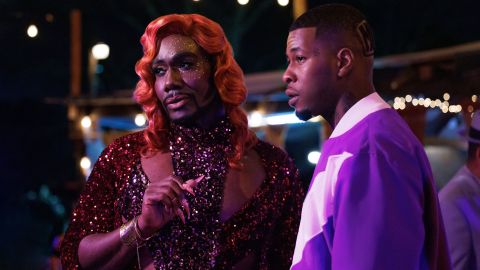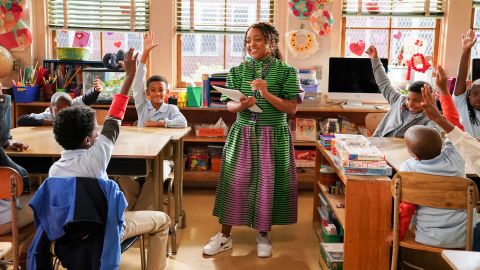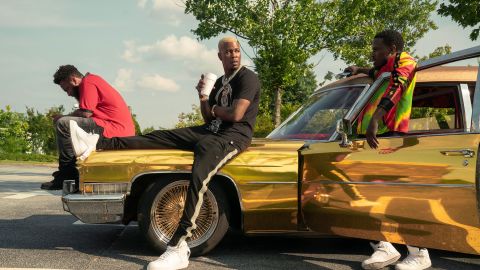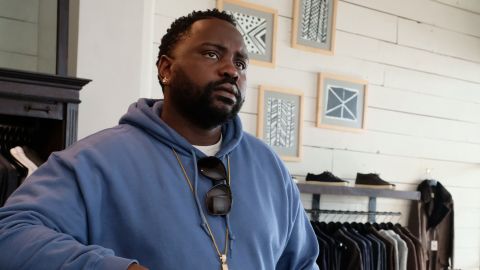CNN
—
For decades, the blueprint for a black show hit similar notes — a stable, middle-class family based in New York or Los Angeles.
Of course, sometimes the family consisted of a group of friends, as seen on “Girlfriends.” And other times the city was in the Midwest, as seen on “Family Matters” (Chicago) or “Martin” (Detroit).
But rarely has a mainstream show featuring black people taken place in the South. And rarely have they depicted struggles outside the existence of the middle class.
A look at recent TV offerings, however, reveals something new. “P-Valley” on Starz, “Rap Sh! .
Their characters aren’t doctors or lawyers – they’re strippers, rappers, farmers, or just plain hustlers. And the shows are all down south.
Telling Southern stories, however, is nothing new. In some ways, television is simply following the lead of other cultural spaces, said Aisha Durham, a communications professor who studies black popular culture at the University of South Florida.
In music and film, the South has been portrayed for decades with nuance and intentionality, Durham said, referring to films like “Eve’s Bayou” and, more recently, “Moonlight” – two films where the setting of the South , respectively Louisiana and Miami, plays a crucial role.
At the same time, new sounds and musical genres emerged from the South, she explained, such as trap. And artists like Beyoncé and Megan Thee Stallion have incorporated Southern black aesthetics into their fashion and music videos.
“You have new bodies, new people, new experiences and I think that invites us to look at the South differently,” Durham said. “I would say TV is almost, especially when it comes to drama series, a bit behind.”
The South has featured prominently in other areas of our culture as well, often receiving national attention – as seen with this year’s votes in Georgia.
For a long time, many people thought of Southern stories only in the context of the civil rights movement and segregation, Durham said. But the South is the foundation for all aspects of American popular culture, she said. And now many look to the region and think of the other stories that can still be told.
“We now see some of the liveliness and vibrancy that has always been part of the South,” Durham said. “We know in the South it’s just everybody is catching up.”
If there’s been a change, it’s a business change, explained Tracey Salisbury, a professor of ethnic studies at California State University, Bakersfield.
It’s not that perceptions of the South are changing, or have changed, but that the industry has changed location, Salisbury said, making Atlanta a major hub for entertainment rather than just New York or Los Angeles.
Tyler Perry, whose work is polarizing to some, based his production studio in Atlanta and has long shot his film and shows in the South. He also has a partnership with the Oprah Winfrey Network, which produces “Queen Sugar.”

There are also simply more black creatives having a voice on TV, Salisbury said, which helps tell new and interesting stories.
“These stories have been present and these stories have been presented before, I just think there’s now a significant talent base and a significant audience … to push Hollywood to support these stories,” she said.
Yet Salisbury is reluctant to call this rise a trend. She cited the example of Quinta Brunson, the creator of ABC’s hit show “Abbott Elementary,” about an elementary school in Philadelphia. Prior to “Abbott Elementary,” Brunson created comedy sketches on Instagram, eventually moving to BuzzFeed and YouTube, until she finally got a shot on a network show. Then she knocked it out of the park, winning an Emmy for writing earlier this week.

“I think that’s always what black creatives need to do,” Salisbury said. “If you don’t knock it out of the park, you have to start all over again.”
In the past, black shows like “The Cosby Show” and “The Fresh Prince of Bel-Air” were intended for mainstream consumption, Salisbury said. Bill Cosby, at the time, was considered “the father of America”, not the father of black America.
The difference with these new shows is in the intent: they’re made by black people, for black people. Uncle Clifford, the non-binary owner of the ‘P-Valley’ strip club, is not America’s uncle, Salisbury said – but his grandmother reminds him of hers.
If most black shows in the past have taken place outside the South, then these new shows become a kind of homecoming — a return to where it all began, Salisbury said.
In other shows, these Southern characters may have been used as a joke. In ’90s “Fresh Prince,” for example, Uncle Phil’s childhood on a farm in the Carolinas is seen as an almost primitive existence compared to life in Bel-Air. But in these series, the South and its characters reject redneck stereotypes and embrace all aspects of the South.
Salisbury used “P-Valley”, set in the fictional town of Chucalissa, Mississippi, as an example. From the fashion aesthetic of the show and its marijuana-infused wings to the very MemphisSsippi specific accentsthe show is deeply rooted in the South — and even takes a few swipes at Southern black religious traditions, Salisbury said.
But it’s done with respect, she noted. That’s why it works.

“We don’t laugh at these people, we laugh with them,” she said.
New York and Los Angeles are often already presented as cosmopolitan and diverse spaces on television. The South, however, is often seen as stuck in the past, Durham said, an already familiar space that lacks the diversity of other regions.
These shows reject those notions.
Durham used “Rap Sh!t” as an example. (HBO Max, which airs the show, and CNN share parent company Warner Bros. Discovery.) The show’s characters live in and around Miami’s Little Haiti neighborhood, she said, allowing for discussions on Caribbean and Haitian culture and on Africa. Americans as an ethnicity alongside other Southern ethnic blacks.
“There are whole ways we need to reinvent blackness in the South,” Durham said.
Then there is the matter of class. In earlier periods of television, the assumed class was always average. This new generation of shows displays something different, Durham said, highlighting the most economically vulnerable people just trying to make it in the world.

These characters are portrayed with depth and sincerity – the strippers in “P-Valley”, for example, aren’t just aesthetic bodies in a trap music video. Paper Boi from “Atlanta” and Shawna from “Rap Sh! Instead, the public is invited inside.
“We’re actually invited to see what the experiences of the people who produce the culture are,” Durham said. “We love the culture but do we know these women and men? These shows give us a way to see that.
These shows then challenge existing perceptions of the South — allowing for the formation of a complex, layered narrative of the region, Durham said.
As these shows point out: There are queer communities in the South. There is sex work; there is the class struggle; there is diversity; there is joy. There are people, not mere caricatures, who are just trying to survive.
